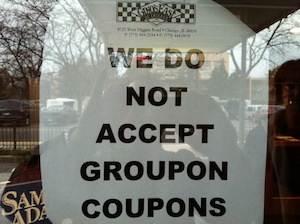Ah, Groupon. Founded only two years ago, the online deal-of-the-day company starting banking big earlier last year. Using a unique marketing concept that appealed to coupon-clipperseverywhere, it seemed that it could do no wrong. Then the quirky little start-up decided to transcend its dot-com roots, buying a Super Bowl ad, something practically unheard of among similar social media based companies with humble beginnings. Sounded like a good step forward. That is, until the ads ran, shocking many sports fans and Bowl commercial aficionados alike for its un-PC take on Tibet.
Of course, by now, the Groupon flub is old news. Anyone who doesn’t live under a rock has seen the ad, either on TV or on YouTube. For a little refresher, the commercial featured actor Timothy Hutton, who starts by offering a little spiel on how Tibet’s culture is in jeopardy. What first sounds like a commercial raising awareness about an endangered culture being oppressed ends with Hutton weaseling like a car salesman about the great deals to be had on Tibetan fish curry, courtesy of Groupon.
Now we can argue all day about whether the commercial was offensive or in bad taste, and we can certainly make a case, as Groupon CEO Andrew Mason attempted, arguing that it was a joke designed to make fun of itself as well as an attempt to lampoon over-the-top, narcissisticcelebrity philanthropy. After all, Mason noted, Groupon is, in fact, donating a nice wad of cashto the causes it seemingly trivializes, so no harm, no foul, right? As the customer and media criticism continued to mount, however, Mason finally cried uncle and pulled the ads, saying a joke ain’t funny if you have to go around explaining it.
 But what marketing lessons are to be learned from the Groupon ad debacle?
But what marketing lessons are to be learned from the Groupon ad debacle?
LESSON 1: A wacky, politically incorrect sense of humor might piss off some people, but it won’t do serious damage to your brand. If you have a controversial idea, a great product, and a loyal customer base, take the risk and go for it.
Groupon got what it wanted. Despite the legions of people crying “offensive” on Facebook and Twitter, swearing never to use Groupon again, the company got a huge spike in publicity. A recent CNET article included a graph from brand research company YouGov, which tracks different companies’ “brand buzz “essentially it’s positive or negative image– on a scale from -100 to 100. After the commercials aired, Groupon brand buzz fell a few points, from 14.4 to 5.3,but then it nearly doubled to 26.6 after Mason’s official apology. This all goes back to what actor Keith David once said, cynical but true: “It can’t hurt, publicity is publicity, controversy and all that, it’s all good.”
Personally, I’m a fan of Christopher Guest (who directed the commercials) and his oeuvre, and I got the humor the first time round. The armchair, self-righteous fist-shaking of those sitting at home being “offended” about Tibet a volatile political situation the details of which I suspect most know very little about doesn’t help Tibet all that much. Now did Groupon make a mistake,underestimating its customers’ ability to decode the intended joke? Sure. Could Groupon have tried harder to make the joke a bit more obvious? Of course. But, in the end, did Groupon trip seriously after its commercial faux pas? Nope, and what’s more, it probably benefited.
That being said, while your customers will forgive you for making these little indiscretions, they won’t be so easy on you if you break their trust at the point of exchange. As noted in a reader comment after the CNET article, “[The ad was] a stupid mistake that can be easily overlooked.However, the botched flower deal is a much bigger issue Trust takes time and effort to build up,but can be lost in a blink of an eye.”
Which brings me to the next Groupon mess-up, and the subsequent lesson to be learned.
LESSON 2: Your customers will turn on you when it matters when you fail to keep promises or when you deliver a sub-par product.
Recently, seemingly recovered from the Superbowl controversy, Groupon messed up too soon too fast, when it offered a deal on Valentine’s Day flowers from FTD.com, then failed to deliver.The Groupon offer included a $20 discount on flowers that are usually marked at $40. When the ad directed customers to a website special Groupon/FTD, the flowers turned out to be the original price with the Groupon discount, meaning that the price came out to the same withoutusing the Groupon discount. Even worse, customers noted that with additional shipping charges,the end was result cost more. Many complained the flowers were of poor quality and some didn’t receive them until the day after Valentine’s Day.
Although Groupon tried to make things right, working in conjunction with FTD to offer refunds,you can be sure that the deal site’s loyal customers have reason to be skeptical about Groupon in the future.
While Groupon is still at the head of the pack in its niche, new deal-of-the-day websites are springing up like wildflowers, and Living Social is making some serious headway in trumping its competitor. Both Google and Yelp have jumped on the daily deal bandwagon, so if Groupon wants to continue succeeding, it can’t afford to turn away its customers like it has in the past few weeks.
Bottom line when it comes to marketing, especially on the Internet, off-color humor won’t be your Achilles’ heel, but letting your customers down in the face of growing competitors will.
Alvina Lopez is a freelance writer and blog junkie. She welcomes your comments at her email Id: alvina.lopez @gmail.com.
